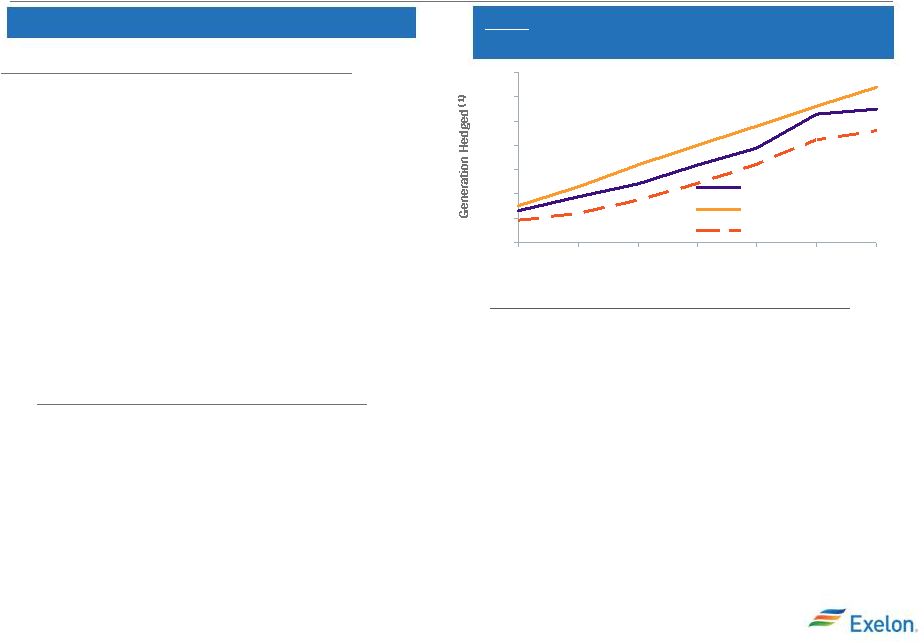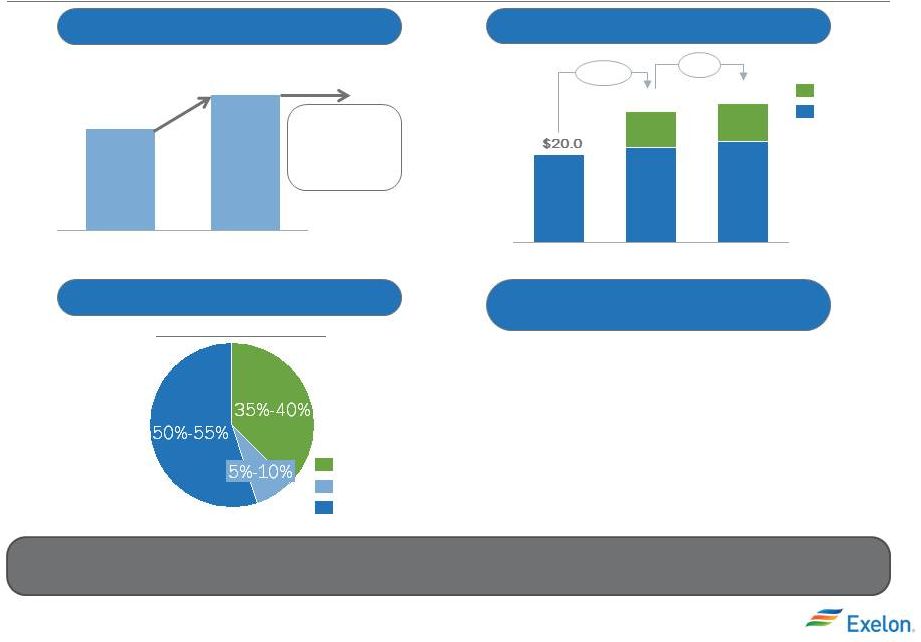Attached files
| file | filename |
|---|---|
| 8-K - 8-K - EXELON CORP | d733724d8k.htm |
 Sanford C. Bernstein Strategic
Decisions Conference
May 29, 2014
Exhibit 99.1 |
 1
Cautionary Statements Regarding Forward-Looking
Information
This presentation contains certain forward-looking statements within the
meaning of the Private Securities Litigation Reform Act of 1995, that
are subject to risks and uncertainties. The factors that could cause
actual results to differ materially from the forward-looking statements made by Exelon
Corporation, Commonwealth Edison Company, PECO Energy Company, Baltimore Gas
and Electric Company and Exelon Generation Company, LLC (Registrants)
include those factors discussed herein, as well as the items discussed
in (1) Exelon’s 2013 Annual Report on Form 10-K in (a) ITEM 1A. Risk
Factors, (b) ITEM 7. Management’s Discussion and Analysis of Financial
Condition and Results of Operations and (c) ITEM 8. Financial Statements
and Supplementary Data: Note 22; (2) Exelon’s First Quarter 2014
Quarterly Report on Form 10-Q in (a) Part II, Other Information, ITEM 1A. Risk Factors; (b)
Part 1, Financial Information, ITEM 2. Management’s Discussion and
Analysis of Financial Condition and Results of Operations and (c) Part
I, Financial Information, ITEM 1. Financial Statements: Note 15; (3) the
cautionary statements regarding the proposed merger with Pepco Holdings, Inc.
included in Exelon’s Current Reports on Form 8-K regarding the
transaction filed on April 30, 2014; (4) PHI’s 2013 Annual Report
on Form 10-K in (a) ITEM 1A. Risk Factors, (b) ITEM 7. Management’s Discussion and Analysis of
Financial Condition and Results of Operations and (c) ITEM 8. Financial
Statements and Supplementary Data: Note 15; (5) PHI’s First Quarter
2014 Quarterly Report on Form 10-Q in (a) PART I, ITEM 1. Financial
Statements, (b) PART I, ITEM 2. Management’s Discussion and Analysis of
Financial Condition and Results of Operations and (c) PART II, ITEM
1A.and (6) other factors discussed in filings with the SEC by the
Registrants. Readers are cautioned not to place undue reliance on these forward-looking statements,
which apply only as of the date of this presentation. None of the Registrants
undertakes any obligation to publicly release any revision to its
forward-looking statements to reflect events or circumstances after the
date of this presentation.
|
 2
Exelon Overview
Power Generation
Constellation
ComEd, PECO & BGE
Competitive Business
Regulated Business
Exelon is one of the largest competitive integrated energy companies in the
U.S. •
One of the largest merchant
fleets in the nation (~35 GW of
capacity)
•
One of the largest and best
managed nuclear fleets in the
world (~19 GW)
•
Significant gas generation
capacity (~10 GW)
•
Renewable portfolio (~1.5 GW),
mostly contracted
•
Leading competitive energy
provider in the U.S.
•
Customer-facing business, with
~1.1 M competitive customers
and large wholesale business
•
Top-notch portfolio and risk
management capabilities
•
Extensive suite of products
including Load Response,
RECs, Distributed Solar
•
One of the largest electric and
gas distribution companies in
the nation (~7.8 M customers)
•
Diversified across three utility
jurisdictions –
Illinois, Maryland
and Pennsylvania
•
Significant investments in
Smart Grid technologies
•
Transmission infrastructure
improvement at utilities
Exelon Generation
Exelon Utilities
2014 Sanford C. Bernstein Strategic Decisions Conference
|
 3
Spot and Forward Market Volatility
Q1 2014 Saw Increased Volatility
Forward Markets Reacted To Spot Prices
Impacts
on
Forward
Markets
•
Forward market power prices and heat rates have
pushed higher year to date due to:
Higher prices in the spot markets that are now beginning
to be reflected in the forward markets as the stack has
changed and there is more reliance on non-baseload,
higher priced resources
Expectation of another 15 GW of coal-fired generation to
be retired between now and 2016
PJM Market design changes that are intended to improve
price formation and locational marginal pricing (LMP)
signals
Spot Market Volatility
•
Spot prices in 2014 have been high and have
started to reflect the changing nature of the grid
and reliance on different resources such as natural
gas supply, demand response, and oil peakers
•
Seeing
higher
prices
at
NiHub
in
2014
than
previous years for similar load conditions
$90
$80
$70
$60
$50
$40
$30
$0
$100
Daily Heating Degree Days (HDD)
Q1 2014
Q1 2013
Q1 2012
NiHub LMP per Daily HDD
(Days below $100/MWh)
10.0
9.5
10.5
11.0
12.0
13.0
11.5
9.0
0.0
4/1/2014
1/1/2014
10/1/2013
7/1/2013
4/1/2013
12.5
Whub On Peak HR -
2016
Whub On Peak HR -
2015
NiHub On Peak HR -
2015
NiHub On Peak HR -
2016
2014 Sanford C. Bernstein Strategic Decisions Conference
|
 4
Portfolio Value and Positioning
Changes to Gross Margin Through 4/30/14
Power
prices
continued
to
increase
in
April
•
Since the end of Q1 and thru 4/30/2014, power prices
in Mid-Atlantic and Midwest regions increased nearly
$5.00 per MWh in 2015 and 2016
•
Open gross margin increase from this power price move
and the removal of DOE nuclear disposal fee (~$150M
annually) is over $1B per year for 2015 and 2016
•
Net of hedges the hedged gross margin increase is
$350M
and
$600M
to
$7,800M
and
$8,000M
in
2015
and
2016,
respectively,
between end of Q1 and
04/30/2014
•
Impact of incremental changes in power prices in May
on gross margin can be approximated using the updated
portfolio sensitivities given below
2015: Open Power Position Creating Value From
Higher Prices
(1)
2015-Actual (excl NG hedges)
2015-Ratable
2015-Actual
10%
20%
30%
40%
50%
60%
70%
80%
4Q13
3Q13
2Q13
1Q13
4Q12
3Q12
1Q14
Impacts
of
our
view
on
our
hedging
activity
•
With the move higher in forward power prices and
market implied heat rates, our behind ratable and
cross commodity hedge strategies have created value.
•
As of 3/31/2014, when considering both strategies,
we had a significant amount of our portfolio open to
moves in the power market:
•
Approximately 45% open in 2015
•
Approximately 70% open in 2016
Sensitivities
(2)
($MM)
2015
2016
NiHub ATC Energy Price
+$5/MWh
$235
$360
-$5/MWh
$(230)
$(360)
PJM-W ATC Energy Price
+$5/MWh
$90
$195
-$5/MWh
$(85)
$(190)
2014 Sanford C. Bernstein Strategic Decisions Conference
(2)
As of 4/30/2014
(1)
As of 3/31/2014
•
We are evaluating the latest market moves and the
impact on our view of upside in the market. Where the
market has increased, we are taking action to lock in the
value that has been created from our strategies |
 5
Capacity Markets Better –
Opportunity for Improvement
New England Auction
PJM Auction
Higher clearing prices led to higher total revenues year over year, but not
enough to clear financially challenged nuclear units
Market design and rule changes impacted auction results
–
Limited product reached constraint of 2,322 MW
What’s next?
2014 Sanford C. Bernstein Strategic Decisions Conference
•
Nuclear Asset Rationalization –
continue to work regulatory and stakeholder process to bring reforms
•
Exelon’s nuclear units Quad Cities (U1 & U2); Byron
(U1&U2) and Oyster Creek did not clear the auction
•
Clearing
prices
higher
but
not
adequate
to
provide
incentives
to
keep
these
clean
generation
assets
operational
•
Incremental
auctions
or
incremental
PJM
or
local
market
reforms
could
provide
avenues
for
incremental
capacity
revenues for these units
•
Exelon has committed not to make any retirement decisions about IL plants
before June 2015 •
IL House has joined effort by introducing resolution (HR1146) that calls for
urgent reforms that recognize value of nuclear energy for its
reliability and carbon free benefits 2016/2017
2017/2018
PJM
Rest of Pool
$59
$120
MAAC
$119
$120
SWMAAC
$119
$120
Average EXC
$92
$120
New England
NEMA
$219
$493
Rest of Pool
$90
$230
Average EXC
$186
$425
Capacity prices $/MW-Day
Capacity market results
Financial Implications
Planning Year
17/'18 vs '16/'17
PJM
$150M
New England
$250M
Total
$400M
(1)
PJM numbers include adjustments for PPA roll-offs
(1)
~
~
~
In Q1, 17/18 auction cleared much higher than expected indicative of
tighter supply/demand after unit retirement announcements
Demand response cleared 10,975 MW; ~1,400 MW lower year over year
(YoY)
Limits on imports into RTO drove imports lower–
4,526 MW cleared;
~3,000 MW lower YoY
DR
rules:
Court
opinion
raises
questions
regarding
demand
response’s
Speculation:
FERC
rejected
PJM’s
reforms
to
address
speculation,
but
agreed that PJM has identified a reliability problem. FERC instituted a
proceeding to determine the appropriate changes to the PJM tariff
(DR) ability to participate as a resource in the future
|
 6
Pepco Holdings Acquisition
Potomac Electric Power Service Territory
Atlantic City Electric Co. Service Territory
Delmarva Power & Light Service Territory
Baltimore Gas and Electric Co. Service Territory
PECO Energy Service Territory
ComEd Service Territory
IL
Chicago
DE
MD
PA
NJ
VA
Philadelphia
Baltimore
Dover
Wilmington
Trenton
Washington, DC
2014 Sanford C. Bernstein Strategic Decisions Conference
On April 30, 2014, Exelon announced the acquisition of Pepco Holdings Inc.
in an all cash transaction
Strategic Rationale
A strategic
acquisition with a good geographic fit and economies of scale,
creates opportunities for cost savings, improved customer reliability
and accelerated storm response.
Purchase price of
$27.25 per share.
Earnings composition supports incremental leverage
and
is
expected
to
be
highly
accretive
to
operating
earnings starting in the first full year post-close with
steady-state accretion of $0.15-$0.20 per share starting
in 2017
Increases Exelon’s
utility derived earnings and cash
flows,
providing
a
solid
base
for
the
dividend
and
maintaining
the
upside
from
a
recovery
in
power
markets.
Balanced financing mix allows Exelon to maintain
balance sheet strength
and provides flexibility to
continue
to
invest
in
opportunities
aligned
with
our
growth strategy.
The combination of Exelon and Pepco Holdings (PHI)
will offer
significant benefits to customers.
The combined utility businesses will serve nearly 10 million
customers, with a rate base of ~$26 billion. |
 7
Earnings
Accretive
First
Full
Year
(1)
Transaction Economics
Provides tangible benefits to the
customers and shareholders
The transaction is significantly EPS accretive, adds to rate base growth and
further strengthens our financials
2015-2016 Operating Earnings
(3)
Pro Forma Business Mix
PHI
Unregulated
PECO/BGE/ComEd
Rate Base Growth ($B)
(2)
+6%
+50%
2016
$31.8
$23.0
$8.8
2015
$30.0
$21.7
$8.3
2014
Exelon
PHI
2017
2016
$0.10 -
$0.15
$0.15 -
$0.20
•
Run-rate synergies of roughly $120 -
$140 million per year
•
Expect 60% of synergies to return to
ratepayers through rate case process
•
Expect 40% to flow through to
shareholders
•
$100M customer investment fund for
rate credits, low income assistance and
energy efficiency programs
2014 Sanford C. Bernstein Strategic Decisions Conference
(1)
Assumes funding mix of assumed debt, new debt, asset sales and equity issuance
with appropriate discount to market price
(2)
Reflects year end rate base
(3)
Business mix as of 3/31/14
Achieve run-rate
accretion of
$0.15-$0.20
starting in 2017 |
 8
Exelon is positioned for a strong future
Power Market Upside
Balance sheet flexibility
Asset Optimization and
Rationalization
Public policy Advocacy
Strong integrated business
model
Our clean, world class, merchant nuclear fleet has unparalleled upside
to the current power market recovery
We maintain flexibility in our balance-sheet to allow for incremental
regulated and merchant investments
We continue to review our asset portfolio and make decisions to
optimize the value of each one of them
Advocate for policies that strengthen competitive markets, limit
subsidies and enhance the value of clean generation.
With Pepco Holdings acquisition, we will have an even stronger
regulated base of earnings that provides dividend support and potential
increase in the future
Core Strength
Implications and Actions
2014 Sanford C. Bernstein Strategic Decisions Conference
Diversification in assets, regions, businesses and keeping abreast of emerging
technologies and macro trends in our industry is central to our long
term strategy |
